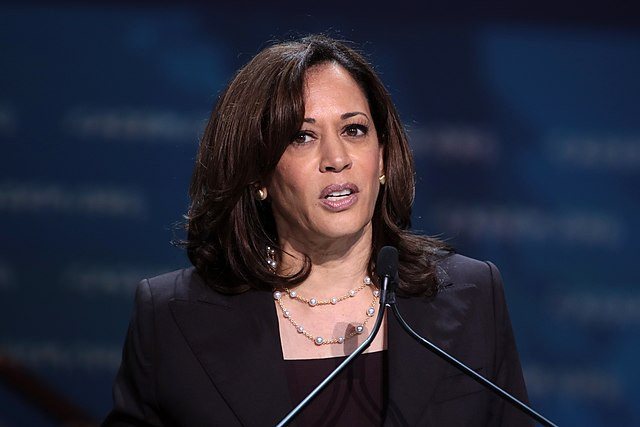Vice President Kamala Harris engaged in a combative and tense interview with Fox News anchor Bret Baier on Wednesday, using the platform to launch sharp criticisms against former President Donald Trump while also seeking to differentiate her potential presidency from President Joe Biden's administration. The exchange, which aired on Special Report, was Harris' first formal sit-down with Fox News and underscored her efforts to reach a broader audience ahead of the 2024 presidential election.
The interview began with Baier pressing Harris on the Biden administration's decision to end Trump's "Remain in Mexico" policy, a move that required asylum seekers to wait outside the U.S. while their cases were processed. Baier accused Harris of overseeing policies that allowed millions of undocumented immigrants into the country. Harris countered by emphasizing the administration's push for comprehensive immigration reform since taking office. "We need Congress to act," she insisted, pivoting the blame onto legislative inaction.
Harris also took aim at Trump's recent rhetoric, highlighting his comments about targeting "the enemy within" and using the military against political opponents. "It is clear to me that Trump is unfit to serve, that he is unstable, that he is dangerous," Harris said, adding, "This is a democracy, and in a democracy, the president should be able to handle criticism without threatening to lock people up."
The tone of the interview remained tense as Baier continued to challenge Harris on various issues, including immigration. When asked whether she regretted reversing Trump's border policies, Harris did not directly address the numbers Baier cited, but she expressed empathy for families affected by violent crimes involving undocumented immigrants. "Those are tragic cases," she acknowledged. "And if border security had been passed nine months ago, we would have had more support on the ground to prevent such harm."
Throughout the interview, Harris worked to distance herself from both Biden and Trump, responding to a pointed question from Baier about how her administration would differ from Biden's. "My presidency will not be a continuation of Joe Biden's presidency," Harris asserted. "Like every new president, I will bring my own life experiences, professional experiences, and fresh ideas." She highlighted her plans to increase housing assistance for first-time home buyers and provide funds for small business startups as examples of new initiatives she would prioritize.
The interview also served as an opportunity for Harris to escalate her rhetoric against Trump. She called out the former president's divisive approach, arguing that his tactics over the past decade have deepened divisions within the country. "He has designed his rhetoric to divide us, to have Americans point fingers at one another," Harris said, suggesting that her election would mark a shift away from such polarization.
However, the exchange was far from one-sided. Baier repeatedly challenged Harris to account for the Biden administration's record, particularly on immigration. At one point, he referenced specific cases involving crimes committed by undocumented immigrants, questioning whether Harris felt the need to apologize to the victims' families. Harris, visibly frustrated, condemned the loss of life but emphasized that the current immigration crisis was the result of a broken system that the administration had been trying to fix.
Baier also probed Harris on more culturally charged issues, including her stance on publicly funded trans-affirming surgeries for prisoners, a topic that has been prominent in conservative campaign ads. Harris deflected the question, pivoting instead to broader healthcare access concerns, but the exchange highlighted the interview's contentious nature as Baier pushed on controversial and divisive topics.
In another segment, Baier questioned Harris about the declining mental faculties of President Biden, a frequent talking point among Republicans. Harris defended Biden, citing his extensive experience and resilience. However, her response appeared measured, as she tried to avoid directly confronting Baier's insinuations. "President Biden has shown time and again his ability to lead this country through unprecedented challenges," she stated.
The tense back-and-forth reached a peak when Baier played a clip from Trump's earlier interview on Fox News with Harris Faulkner. In the clip, Trump mocked his opponents and characterized them as enemies within, comparing himself to infamous mobster Al Capone. Harris criticized Baier's decision to air the clip, arguing that it normalized dangerous rhetoric. "This is precisely the issue with Trump-his words are not just words; they incite division and violence," she asserted.
The interview concluded with Harris addressing her broader campaign strategy and emphasizing her commitment to unifying the country. "This election isn't meant to be easy, and we knew that going in," Harris remarked. She stressed her intention to engage with all voters, regardless of their party affiliation, and highlighted her efforts to appear on platforms like Fox News to reach audiences beyond the Democratic base.
Despite the intensity of the exchange, Harris avoided any major missteps or controversial sound bites that could undermine her campaign, sidestepping opportunities for Baier to pin her down on difficult questions. Political analysts noted that while the interview was combative, it reflected a strategic move by Harris to counter criticism that she has been unwilling to face tough questions from media outlets typically hostile to her administration.
Fox News analysts, including Dana Perino, commented on Harris' performance, noting that she "came in hot" and remained on the offensive throughout the interview. Baier, known for his tough questioning style, maintained his reputation as one of Fox News' more balanced anchors, despite the confrontational tone. Both sides landed blows, but as with many high-stakes political interviews, neither emerged as a clear victor.
The interview underscores the stakes for Harris as she continues to shape her narrative ahead of the 2024 election. With a tight race against Trump looming, her willingness to confront her critics and draw sharp distinctions between her vision and Trump's may prove critical as the campaign progresses.






